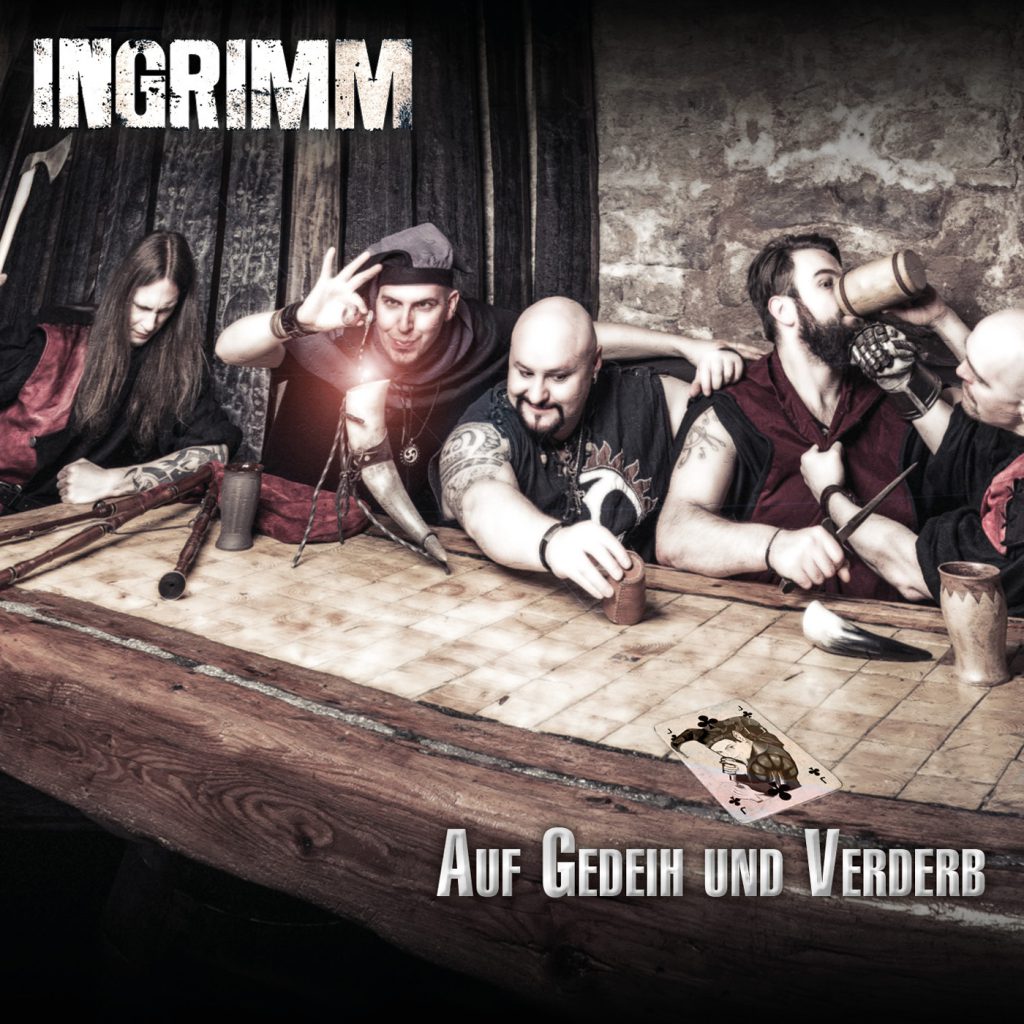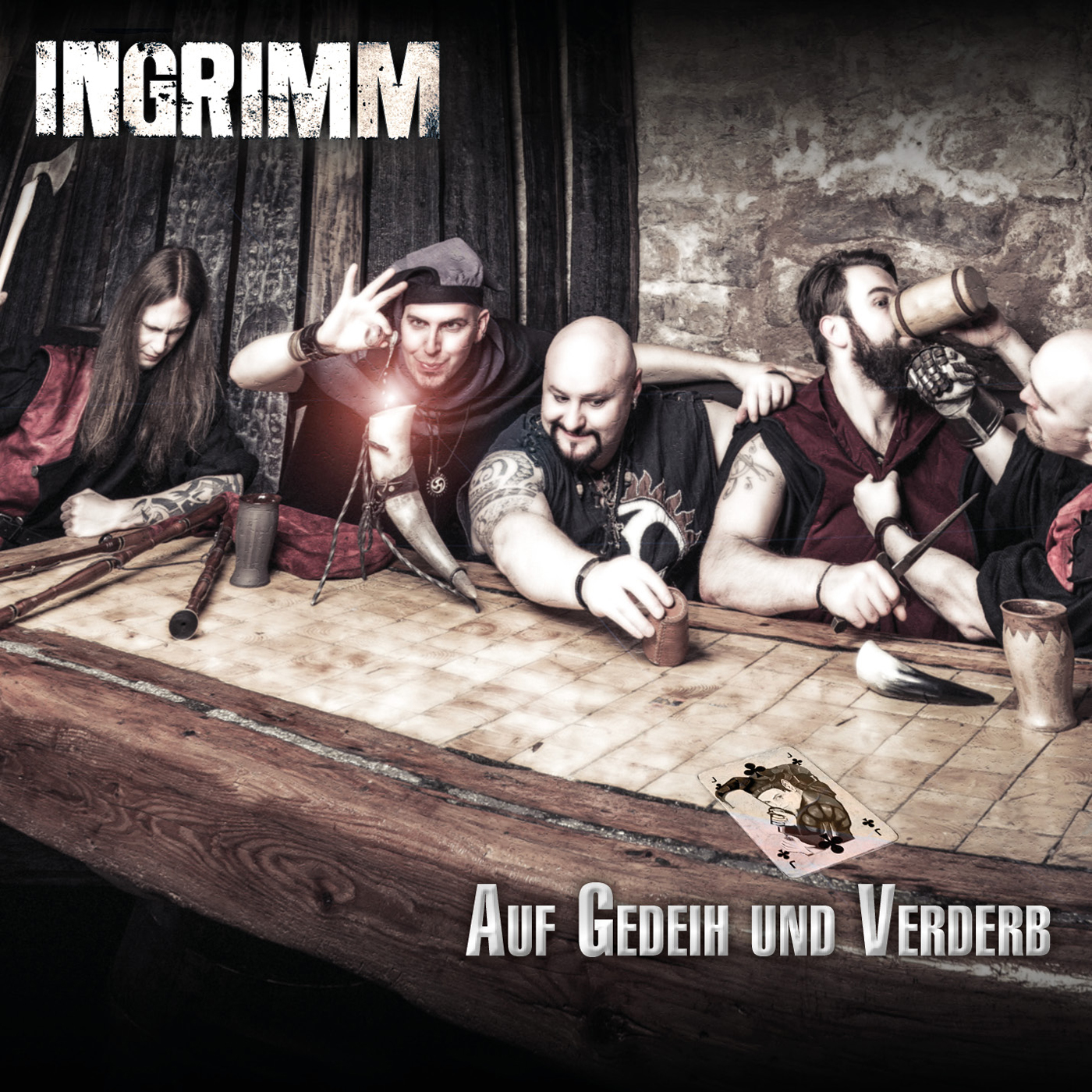Label: Hardy Entertainment
Release date: 10 January 2020
Originating in Regensburg, Germany in 2005, Ingrimm first began as Igni Et Ferro, briefly changed to Grimm before realizing a Dutch band had already taken that name, and changed to its final form as Ingrimm by 2006. The act initially started as a way for former vocalist Stephan “Fenris” Zandt to give his poetry a life of its own by being backed by loud and hard music, but one man couldn’t do it alone. After enlisting the help of guitarist Alex Haas, medieval instrumentalist Christian “Hardy” Hadersdorfer, and bassist Baba (eventually replaced by Fuzzy, and then Mugl), the quartet very quickly made a name for themselves, releasing two albums and performing at Wave-Gotik-Treffen, Hörnerfest, and Wacken Open Air within their first four years. In 2010, the band saw their first German tour as well as the release of a third album, Böses Blut, but during this time, difficulties arose that led to the departure (and return) of Hardy in 2011 and the definite departure of founder and vocalist Fenris in 2012. René Brandt replaced Fenris as vocalist and in 2014, the group released their first album with a new voice and fourth album overall, Henkt ihn!, to mixed but mostly positive reviews.
Ingrimm has been labeled as medieval metal due to their use of bagpipes, flutes, and hurdy-gurdy, courtesy of Hardy, but many have called these instruments an afterthought or a quirk to get them to stand out from the crowd rather than a primary part of the music’s composition. Additionally, their style is a bit unusual for the genre due to the use of a combination of guttural and clear vocals over electric guitars and double bass drums, toeing the line over black or death metal with a mix of heavy and glam metal in both sound and execution. Generally speaking, Ingrimm has a sound that metal fans and reviewers certainly like, but never enough to seat them in a higher position than an opener or second stage at a festival. They are compared often to Subway To Sally and In Extremo, two well-known German medieval metal bands often praised for their contributions to the genre, but never more than a passing reference and a subtle wish for something a little more than what Ingrimm puts out. While each album Ingrimm has released is tighter and bolder than the last, most fans of the genre are left either disappointed or with very little opinion after listening. In other words, they definitely aren’t bad, but it’s nothing to write home about. Despite the many lineup changes and being viewed as mostly mediocre, Ingrimm has now successfully released their fifth album, Auf Gedeih und Verderb, after five years of radio silence.
Himmel und Hölle starts the album with its quick, seemingly half-inflated bagpipes that erupt into René’s clear vocals, higher-pitched and somewhat more forced than that of prior vocalist Fenris. Backed by guitars and drums that bleed together and a violin trying in vain to be heard, the song is a bizarre cacophony haunted by those poor, sad bagpipes. Shaking off the confusion, Klang von Leder is more traditional in its approach with staggering guitar sections, held notes harmonized between guitar and violin, and drums played with such determination you can practically hear the sweat falling from drummer Finzl’s brow and mingling with the sticks. The next track, Albtraum, can’t seem to make its mind up about its own rhythm, sometimes going fast and other times stopping entirely, much of the track bowing to the wishes of the bagpipes and their mysterious tune. At one point, it seems to be a completely different and singularly un-metal song, returning to its original metal feel just long enough to end just as quickly as it started. König der Idioten begins with a few emotional bars, but it’s back to business less than a minute in, the violin playing cheekily behind glam-y vocals and mostly forgettable work from the guitars. The track doesn’t have a satisfying or clear conclusion, but Glück in Sicht makes its presence known with the return of the bagpipes, this time playing with no real melody, as the guitars take on a cheesy 80s vibe that is again very un-metal. The off-putting bagpipes, the simple and direct guitar notes, and René holding strong with blackened power metal vocals combine to make a musical trainwreck that you can’t stop listening to because, well, it’s not really all that bad. Regardless, it is relieving when Sturm und Drang starts, a more classic metal feel to be found in its composition, including sharp triplets from the guitar and a liberal use of cymbals. This track is one of the best to be found in the album, with the bagpipes, violin, guitars, drums, and vocals all bringing a little of something without it being too much, and creating a solid song… and not much more.
Halfway through, Drachenritt opens with an inquisitive fade-in and inserts this brief composition throughout, the tone of this track feeling very much like a German Dream Theater cover band that started writing their own songs. Curious and obviously thought out, the song has much more polish than the rest of the album, and sadly ends far too abruptly, the fade-out cutting off René’s final vocals. Coming off of this, Ich bin ein Mann takes the listener back to the less-than-impressive sound found in previous songs, all of the instruments more or less blending together. That is, until a sudden change near the end has the bagpipes playing Scotland the Brave that turns the supposedly serious track into comedy, and no amount of heavy metal work can bring it back. The next track, Schalk im Nacken, is the shortest on the album and as such feels rushed and unfinished, only starting to feel like it gains a good rhythm just before the song ends with a very flat conclusion. Mammon is unfortunately more of the same, nothing particularly gripping and fairly monotonous until the midway point. Here, the pace slows and a more traditionally “evil” metal sound is taken on, the focus being placed on the guitars’ chord-rich solos and the harmony the bagpipes give. Unfortunately, this only lasts about a minute before it’s back to usual, and it’s hard not to sigh from disappointment after hearing yet another track with an ending that severely lacks anything definitive. Surprisingly, Der Schinder follows this with a sombre hook from the violin and drums that hint at something greater that is soon to come. When René adds his vocals, the track gains a new dimension, becoming somewhere between a ballad and a war song, the persistent melody from the violin betraying René’s rage to reveal a kind of sadness. This is by far the best track on the album and shows that hidden gems can be found if one looks deep enough. Finally, the album closes out with Schuldig oder nicht, a menacing waltz that competes with simple yet powerful riffs, René’s voice leading the dark orchestra. A brief contemplative set of bars breaks away from the heaviness before bringing it back again, René’s growls an excellent accompaniment to the softly pleading violin that leads this track to the first quick conclusion that actually works instead of falling flat.
The difficult part of writing reviews is trying to sell the reader on listening to the album, and unfortunately, there is little reason to pick up this release. While Sturm und Drang, Der Schinder, and Schuldig oder nicht are well crafted examples of medieval metal that don’t grate on the ears, the other tracks bring down the value of this album significantly. Auf Gedeih und Verderb is good for a listen, but isn’t even the best that Ingrimm has to offer. Whether this is due to the many lineup changes (including the departure of the original vocalist) or if the group has just lost their spark is unclear, but it really only gets a passing grade.
Line up:
- Christian “Hardy” Hadersdorfer – Bagpipes, flute, hurdy-gurdy
- Alexander Haas – Guitars, vocals
- René Brandt – Vocals
- Alexander Finzl – Drums
- Mugl – Bass
- Julia Wink – Violin

- Himmel und Hölle
- Klang von Leder
- Albtraum
- König der Idioten
- Glück in Sicht
- Sturm und Drang
- Drachenritt
- Ich bin ein Mann
- Schalk im Nacken
- Mammon
- Der Schinder
- Schuldig oder nicht










More articles
Veuve – Pole
Jerry Cantrell – I Want Blood
Tidal Shock – Riffs of Ha